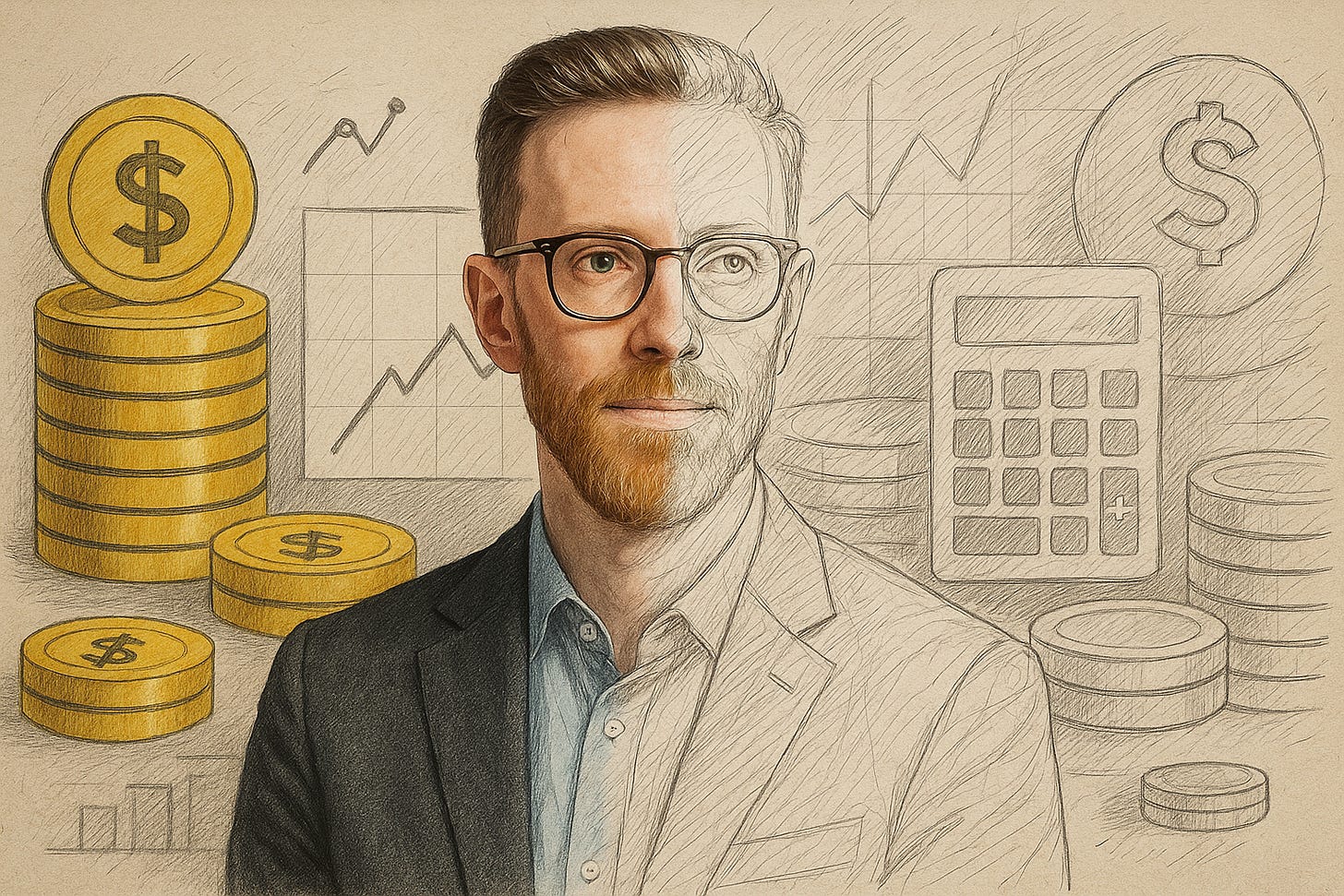Interview Series: Simon Taylor
The Arena Tour Years of Fintech—With a Conductor Who’s Seen It All
If you’ve ever read Fintech Brainfood and thought, “How does he make compliance sound…cool?”, you’re in for a treat. Simon Taylor has worn nearly every fintech hat imaginable—from apprentice wrangling mainframe data into spreadsheets, to consulting for giants, to helping fight scams with Sardine—all while making it look deceptively easy. In this wide-ranging chat, Simon shares how a bored telco intern became one of the most respected voices in financial innovation. Expect wit, wisdom, and a few uncomfortable truths about Excel, edge cases, and why fintech is more about messy humans than tidy code. And if you wonder how can he do it all, thanks to our AI assistant, we were able to wrap that chat into a coherent and enlightening panoramic view of the Fintech world. So let’s discover a bit more on one of Fintech highest profiles.
The Delivery Man (DM): What’s the most non-influential job you’ve ever had—and what did it teach you about financial services?
Simon Taylor (ST): I started as an apprentice working for a telco, and my job was to take code from the mainframe and make various bits of data appear in a .com and mostly in Excel spreadsheets. And what it taught me is that the world runs on mainframe and spreadsheets, but it also taught me that you can automate away a lot of people's jobs quite quickly. We had a chap who worked in the office whose entire job was to deal with various errors that popped up from bad bits of code, and one day, as a 16-year-old, I decided I would automate those errors away. I had a job, but another team of about 10 people, and they were actually let go from the business. Which I thought was quite cruel, but it also speaks to how many people were and still are in financial services building sensors of power and maintaining the same sort of job. It was a real eye-opener.
DM: What first drew you into the world of financial technology—was it curiosity, chaos, or pure accident?
ST: Pure accident. I got a job in 2009 working in a data center for a card processing company and I had no idea what I was doing. And whilst reading TechCrunch at the time, I discovered all of these other things happening in financial services. And I was so bored in the data center project management job that I had, that I would email it to senior executives. And instead of telling me off, they actually ended up creating a job for me as their head of innovation. So I think it was curiosity, chaos, and pure accident. All of the above.
DM: Was there a “Eureka” moment early on that made you realize fintech would reshape financial services?
ST: I think there were lots of little Eureka moments. Something like when Stripe got announced, or Square got announced, that this was obvious that big tech Silicon Valley was coming for finance. It just seemed obvious, didn't it seem obvious to everybody else?
DM: You’ve worn multiple hats—consultant, strategist, creator. What part of your early career shaped your thinking the most?
ST: I actually think all of my career has shaped my thinking in various ways, but I'd say the most influential bits have been working in the telco, working in the payments company, working for a bank at Barclays, and actually delivering things into production. I sort of had this tension of watching big tech happen, really feeling like a genuine engineer and startup guy stuck inside of a big company, and that contrast, that contradiction has always shaped my thinking.
DM: If you could give your 23-year-old self one piece of advice before diving into this world, what would it be?
ST: It would probably be “move to London sooner”. I moved when I was 29. I think I would have moved when I was 23 regardless of the job. I should have just taken it even if it was less money. I think I've always tried to optimize the base cash early on when I should have been optimizing for learning and being close to where growth was going to be.
DM: Fintech Brainfood will soon have over 50,000+ readers—what started it, and did you ever expect it to become a fintech mainstay?
ST: Yeah, it really surprised me. No, I didn't. I didn't start writing it for it to become a fintech mainstay. I started writing it because I found things interesting, and people asked me to keep going. And I keep finding things interesting, and now I can't stop myself. Most people never knew about it. I was writing for 11FS when I worked over there. I was writing on the internal SharePoint when I worked at Barclays. It's something I've always done. It just seems during the pandemic, everybody sort of took notice, and I caught the wave of, you know, banking as a service, and I was one of the people that could explain it because I happened to have worked in all of those parts of the industry that make sense for it. And I think there were a lot of people from tech trying to understand things and a lot of people from sort of the finance world trying to understand things, and I could speak both languages.
DM: What’s the biggest mistake you see people make when starting in fintech—and did you make it too?
ST: I think the biggest mistake is trying to pattern match finance to any other technology. Finance is messy. Finance looks like it should be a calculator. It should look like it should be a database. But actually, it's about messy humans contracting together and fraudsters not paying each other. It's a technology conversation. And once you understand that really what you're building for is all of the edge cases around the humans, you understand that what you're dealing with is actually a hundred times more complex than it seems on the surface.
DM: You’ve covered everything from banking to blockchain. Which sector has evolved the most under your watch?
ST: The obvious answer is payments. The fact is that startups like Adyen, Stripe and Checkout and many others are now becoming at least 30% market share, and if they keep it going, they'll be the dominant players in the next 10 years. So on the acquirer payment side, it's a very different market. On the issuer processing side, maybe a bit less so, but that could change in time. And on the consumer mindshare side, it's starting to change, and it varies market by market. You have Revolut now with 50 million customers, and in Ireland, they are 50% market share. There are parts of the world where the mobile-only fintech bank is the biggest bank in the market, and I think sometimes we forget that. So the biggest change is that mobile-only has become a default, and that modern digital payments have become a default. The question is, how long till the other things start to catch up?
DM: The move to Sardine was unexpected to some—what made you jump into scam-fighting mode?
ST: The honest answer is I had a family member impacted by scams and one of the very next phone calls I had was with Soups and he showed me coincidentally precisely how he would have detected that kind of scam and I took it as a big sign from the universe what to do. And I think in a sense we've invented a creator-in-residence type of model where, you know, my role now is doing a lot of market development, making sure that people are aware of Sardine, making sure that Sardine's message is landing in the right places, making sure that people know who Soups is and at the same time growing my own personal brand. And it's become a wonderful symbiotic relationship that I think works for everybody. It's actually quite hard in practice, but having somebody like Soups and having a company like Sardine who are very innovative, very open-minded—it's really really worked. We can see it in the metrics, we can see it in the success, and I think that gives me a lot of confidence about them as a company—that they are ultra flexible, that they ship super fast, that they're open-minded—and that was true three years ago and it's true today.
DM: You work at the intersection of compliance and content. How do you balance being informative with being engaging?
ST: That's the tension we try and strike every day. Sometimes you go too hard towards engaging, and people go on to question your credibility. And sometimes you go too hard towards compliance, and nobody pays attention. We honestly vary it. My account can do things that are a little bit more engaging, and Soot's account, we focus a little bit more on credibility. But more than anything, we deliver consistency. Try and make a good social post five days a week, every week, and try and have that perform. Surprisingly difficult. There's no lack of things to say, however. And if you work with a team like that, there's always plenty of stories to tell. So what I got excited as well about Sardine is there's always something to say. And the riddle, the question, is figuring out how to say it.
DM: What’s one trend we’re currently overhyping—and one we’re dangerously underestimating?
ST: Agentic AI—we're dangerously overhyping and we're underhyping. It's a cliché, but people understate the pace of change and understate the impact. Agentic commerce has almost zero volume, but it will suddenly have massive volumes. And when that slowly-suddenly inflection point happens, everything changes. So we need to really pay attention to it. And same for stablecoins—we're overhyping it and we're underhyping it. Overhyped in the sense that it's getting insane valuations. It's potentially every story you see is about it. And it doesn't necessarily warrant that. It's not necessarily going to be of major impact on banks' deposits anytime soon. But it is really meaningful if you're in cross-border payments. And I think it's finding the signal through the noise that is just super important.
DM: Which country or region do you think is quietly building the future of finance?
ST: I don't think there's one, because finance is as idiosyncratic as every country it's in. It's as idiosyncratic as its compliance laws. Yes, there's obviously a lot going on in Silicon Valley, but there's a real boom in local, domestic innovation. I would say, for instance, has really led on a lot. You could talk about all of Latin America. You could talk about India. But the Indian UPI, and the Brazilian Pix story, and the Nubank story, and the Zerodha story are all very, very different in their own ways. So it comes down to, really, instead of everyone building the future of finance for their industry, my question is: who's building the global financial rails and the future of global capital markets? And that's where I do get excited about tokenization, because it's crazy to say it to some people, but Bitcoin is becoming a major part of capital markets, and nation-states are accumulating Bitcoin, and tokenized gold, and tokenizing assets. In that world, we could see something where the dollar starts to change, and the role of digital assets versus more traditional assets starts to change.
DM: What’s a fintech myth you wish would disappear faster than a poorly implemented stablecoin?
ST: I think myths on two ends of the spectrum. One myth is that in the end, the banks will always win, and these innovative companies are just regulatory arbitrage. I mean, that needs to go away. There is some reg arbitrage, and some of it suits the banks, and some of it suits the fintech companies. I don't want your belief system. They're not a crop to be harvested. We're here to solve their problems.
DM: Is fintech truly disruptive—or are we just rearranging the old banking furniture with newer buzzwords?
ST: Cashflow underwriting allowed people to get access to credit that never had it before because they were a thin credit file. I would say that's genuinely novel and a genuine innovation. Buy Now, Pay Later fundamentally reshaped the e-commerce shopping experience and whilst there's nothing new under the sun, then we also end up reinventing lots of things. We could argue that really an aeroplane is just a form of transport, right? Like, really a combustion engine is just a form of steam engine and really a steam engine is just a form of horse and cart. We already have those. So, the nothing new argument is one that's just a silly bias ultimately. One could argue that fintech really transformed the experience for consumers and forced everybody to adapt and didn't meaningfully change market share, but I go back to my earlier point about payments. That said, I do think this is where tokenization is a genuine, genuine breakthrough because historically we'd always recorded assets as an asset and liability on a centralized ledger. That really hadn't changed. We'd still fundamentally just digitized paper processes, whereas now what we're doing is we are changing the manufacturer of financial products, not just the distribution.
DM: What’s your personal fintech “hill to die on”—the contrarian belief you’ll defend against a mob of VCs?
ST: That fintech is universal. That whatever you want to call it today, finance will be around forever. And finance is fundamentally desperate to be a horizontal, but the only way to win is to deeply understand compliance and risk and humans and messy things. And the interest in fintech seems to wax and wane. The interest in stablecoins and Web3 or whatever you want to call them wax and wanes. In 2021, it's all anybody wanted to talk about. In 2023, the idea of talking about it was just, oh, get away from that. Figure out something in AI, please. And then in 2025, stablecoins are all anybody wants to talk about. And stablecoins are interesting in 2021. They're interesting in 2023. And they're interesting in 2025. Let's just have some conviction, folks.
DM: If you had to explain Web3 to a medieval banker from Florence, how would you do it?
ST: Hey Banker in Florence, can you show me your ledger please? You see these assets and liabilities that you're recording here on the parchment? Imagine if everybody else's parchment could magically see the same as yours. It's magic. Whatever you write down on yours gets written down on theirs too. We all come to agreement about it like a giant council, but the magic of computers and mathematics and Galileo's machines make it all happen.
DM: What fintech buzzword makes you roll your eyes so hard you can see your own cap table?
ST: Finfluencer is one that really bothers me and I think there are a lot of people on TikTok giving out financial advice and it's horrible. Another one is Omnichannel. To this day I still hate it because anybody with an omnichannel strategy is somebody that doesn't think in platforms and it would vary by the day. I think every day has a new horrible word.
DM: If Fintech were a band, what era are we currently in—garage startup, arena tour, or nostalgia-fueled reunion tour?
ST: Yeah, we're in the first Arena Tour’s possibly difficult second album.
DM: What’s the weirdest scam you’ve encountered? Extra points if it involved livestock or lost treasure, lesser point if it has a Nigerian Prince.
ST: You know, I can't think of a weird one, but what's coming to my mind are some fairly obvious ones with deepfakes. The company that was deepfaked out of 25 million dollars because the poor financial controller thought they were on a conference call with eight of their financial leadership, including the CFO—and how normal that's becoming.
DM: Let’s say you’ve just fixed scams and educated the world. What’s next—Prime Minister of Fintech Island? Or something even more absurdly useful?
ST: I think my next chapter, after trying to figure out where on-chain and off-chain compliance comes together, is unlocking on-chain finance and really taking it mainstream.
DM: Thank you Simon “Sy”! Talking to you is like upgrading your fintech brain with a multi-year software patch—equal parts practical insight and future-facing clarity. Whether you’re poking holes in buzzwords, defending the contrarian hill of “fintech is forever,” or explaining Web3 to a medieval banker (I would love to hear the full version of it for sure!), you remind us that behind the jargon lies a very human industry. And if this is fintech’s arena tour era, then you are clearly the guy tuning the instruments and writing the setlist. Encore, please.







